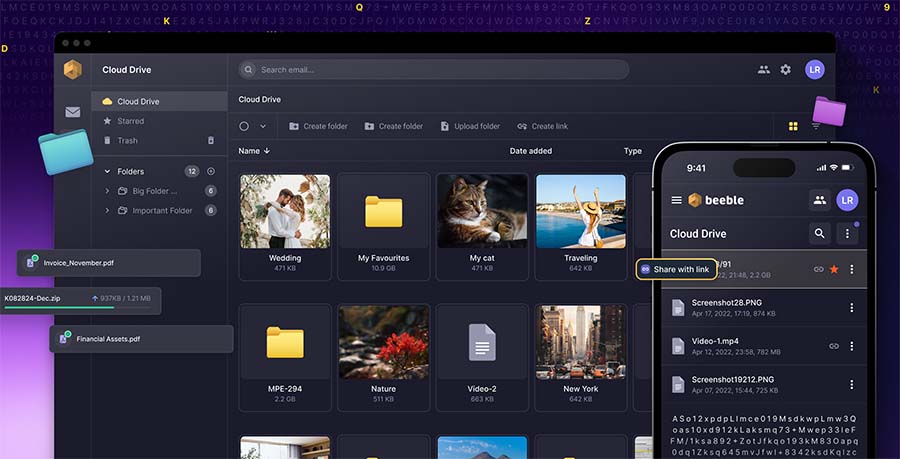How Secure Is Cloud Storage?

Is The Cloud Secure?
Nowadays, people depend on the cloud. It allows them to store and access important information easily. They choose it because of the convenience, scalability, and flexibility — but some fret about how safe their data is when using cloud storage. There are more and more cyber-attacks now than ever before, and sometimes, data gets out of places where it should stay private. So, one should be able to determine the intricacies of cloud security and how providers like Beeble address these concerns.
What is Cloud Storage?
Instead of using local storage devices, people can store data on remote servers accessible via the Internet. This practice is called cloud storage. By doing so, they can access their information from any computer or smartphone connected to the internet, whether at home or work. In most cases, these cloud storages have some security features that are dependent on the type of service provider as well as the measures implemented.
How Does Cloud Storage Work?
Cloud storage is based on a simple and strong principle: information is kept on remote servers that are managed by cloud service providers, and accessible to users via the internet. Here’s a breakdown of how cloud storage works:
- Data Upload: Users transmit data over the internet to cloud provider servers for data upload.
- Storage Allocation: The cloud service provider allocates storage space and organizes it with metadata for indexing purposes during storage allocation.
- Data Replication and Redundancy: To prevent loss, duplicate data is stored across multiple servers in the cloud.
- Access Data: Users can access stored data using authentication credentials from any device connected to the internet
- Data Retrieval: After a user requests a file, the provider will send it back to them on their device.
- Data Management: Additional features like sharing files and versioning enhance collaboration.
The Cyber Security Risks of Cloud Storage
Although cloud storage has its advantages, it exposes users to certain dangers which they should take into account. The risk of cyber attacks such as data breaches, ransomware attacks, and malware infection is among the topmost worries. Such threats may undermine the security of confidential data in the cloud, resulting in monetary loss as well as harm to one’s reputation with possible legal consequences.
Cyber Attacks Risk For Cloud Storage
The number of cyber attacks on cloud storage services is increasing. Hackers take advantage of weaknesses in security protocols to break through and get unauthorized access to data. Such incidents may comprise but are not limited to phishing, brute force attacks, and insider threats. For this reason, a business or an individual needs to stay watchful and enforce strong security systems like Beeble against any malignant activities that could put their data at risk.
Data Loss
Storing information in the cloud without adequate security settings can result in significant risks due to data loss. Although cloud service providers usually have backup strategies in place to prevent data from being lost due to hardware failures or natural disasters, there may be unforeseen dangers. Data loss can occur due to events including accidental deletion, data corruption, and service outages — which is why it’s crucial for organizations always to have regular backups and disaster recovery plans in place.
Unauthorized Access to Data in Cloud Storage
Data security is a big worry for companies that rely on cloud storage. If there are no appropriate measures of safety put in place, then hackers may take advantage of some vulnerabilities in authentication systems to gain unauthorized access to sensitive information. Such acts lead to the stealing of information, and identities among other related harmful purposes; therefore it endangers both individuals as well as organizations.
What is secure cloud storage?
For secure cloud storage, files are encrypted first and only then uploaded to the cloud networks. In that case, the data can only be decrypted by authorized users. Beeble’s Encrypted Cloud Storage goes a step further in file protection by utilizing randomly created AES-256 keys to encrypt data. This additional key is safeguarded using a personal 4096-bit PGP key. With Beeble, there are no technical means for decrypting files without the participation of the user and their password, ensuring that your data in the cloud remains confidential and secure.
End-to-end encrypted cloud storage
One of the most effective security measures implemented by Beeble is end-to-end encryption, and the same technology is used in the Encrypted Email service. Every file in Beeble Cloud has a unique encryption key which is randomly created. The key generated for each file is then encrypted using a password that is exclusively known to the user. All encryption processes take place on the user’s device to protect your data, ensuring that data in the cloud remains encrypted and secure both in transit and at rest. Even if data is intercepted during transmission or compromised on the data center side, it remains encrypted and unreadable to anyone without proper authorization.
Two-factor authentication
The security of cloud storage accounts is increased with the use of two-factor authentication (2FA). It makes it necessary for users to provide two different types of verification which ensures that their information is kept safe. In the context of the cloud storage platform, this feature helps stop hackers from getting inside, even if they have managed to steal someone’s password. Beeble also enhances security by requiring users to authenticate their identity using two-factor authentication methods.
Create policies
To lessen the risks linked to cloud-based data storage, it is crucial to put in place information classification policies and data loss prevention measures. This can be achieved through data classification according to its sensitivity and the introduction of precautions against information loss so that enterprises will be able to protect sensitive data in the cloud network from hackers and virtual attacks.
FAQ
Can your cloud be hacked?
With industry-leading security measures such as end-to-end encryption and two-factor authentication, Beeble Drive makes it difficult for unauthorized individuals to access data or launch cyber attacks. Although no system is completely immune to hacking attempts, Beeble’s strong security protocols make it highly unlikely that cloud data breaches will succeed. Beeble prioritizes the security of your information and has implemented strict measures so you can have confidence in this cloud storage solution.
Can the cloud lose data?
People worry about data loss in any storage system, cloud storage included. However, Beeble works differently: it distributes information across multiple servers. So even if some of them stop working or something unexpected occurs, you won’t lose anything — your data will be safe. And if you want to make sure nothing bad ever happens to your data, Beeble can help with that too — they offer data backup and recovery options, so there’s always another copy available in case something goes wrong with the original one.
Which is the most secure cloud storage?
As a reliable industry leader, Beeble Drive shines in the area of secure cloud storage. It keeps your data safe by employing measures like two-factor authentication and end-to-end encryption. Moreover, you can customize policies for loss prevention and data classification when using Beeble. This means you won’t have to worry about unauthorized access or cyberattacks compromising sensitive information stored on their servers. Choose Beeble Drive if security matters most when selecting where to store your files in the cloud — they’ve got it covered.



See you on the other side.
Our end-to-end encrypted email and cloud storage solution provides the most powerful means of secure data exchange, ensuring the safety and privacy of your data.
/ Create a free account

